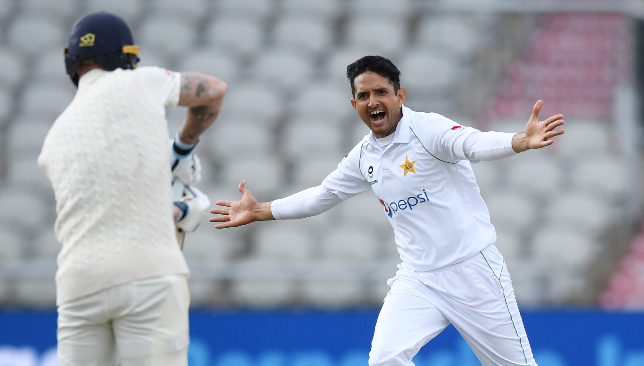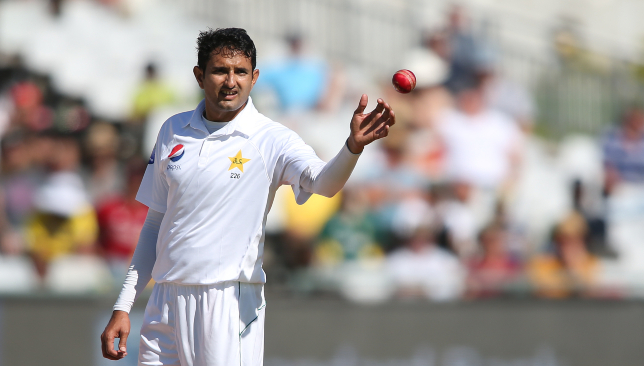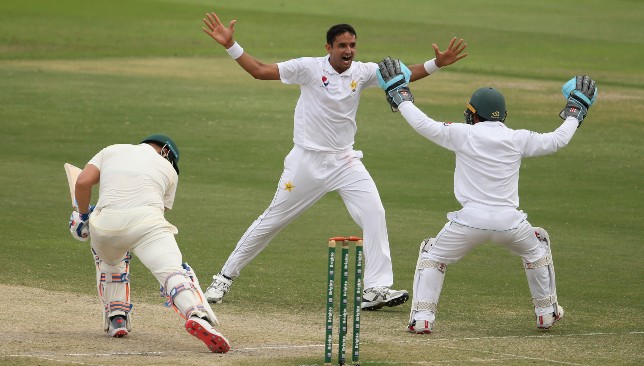
[ad_1]
Just over week or so ago, I returned to one of my favourite cricket stadiums. It was one of those lovely days stuck between summer and autumn; my first foray back into a media centre, all ‘vaxxed up’, and tested. I arrived just in time to watch Hampshire being dumped out of the first match of T20 Finals Day by Somerset, a relief that I was able to connect with my Hampshire contact a few days prior, I’ll name him shortly, first I need to add some context for my story. I’ll try not to bore you too much.
Travel back to 1980, sadly without the aid of a DeLorean, and bring to mind a long family holiday to Pakistan – the norm with many expat families, mine being no exception. There was I, a naive and very shy (or so I thought in my mind) 10-year-old. At the time I needed something to keep my mind off the boredom I was expecting for the next six months in what was a completely alien environment.
There was one saviour: cricket. I spent most of my holiday in a small town called Sambrial, part of Sialkot district (yes, where the majority of the world’s footballs and surgical instruments are manufactured). As it was my dad’s hometown, I had no choice in the matter of location. I would have preferred the bustling metropolis of Karachi as somewhere to spend 6 months. But that didn’t happen.
In an open area outside my family home, I would venture daily to the small haveli stuck in between my dad’s land and some houses. Almost every day there would be some older boys and men playing cricket on a patch of grass no bigger than a medium-sized swimming pool. At first, they were hesitant about letting me play, thinking I may hurt myself. I like to think I proved them wrong. This was my proper introduction into the men’s game with a proper hardball; since no one had pads, or gloves, you had no choice other than to play the ball with the bat – on a very uneven surface. We didn’t have the luxury of a groundsman, heck we barely had a ground. Shane Watson would have never been out LBW if he played on this track!
Every Friday morning without fail, my family would visit my great grandmother, who lived in the village of Jheteke about 2 miles away, a village no bigger than Regents Park in London at most. We would normally travel by a horse carriage called a tanga, no Uber in 1980. Not as glamourous as it sounds. Try sitting on any vehicle which has a mind of its own and no suspension, though it certainly had emissions – mostly natural.
Only in my wildest imagination would I have thought that one day a village this small would produce one of Pakistan’s best modern-day Test bowlers, as well one of its humblest. Jump forward 26 years – Muhammad Abbas makes his Test debut against the West Indies.
Back to the 21st century– I first met Abbas at Canterbury when he was touring in 2018 with Pakistan. My friend and ex-Kent stalwart Azhar Mahmood at the time was also Pakistan’s bowling coach. He knew that we were both from the same area and would have a lot in common. After a brief chat our paths didn’t cross again – until a few days ago, albeit virtually on Zoom. We had a quick informal chat about our respective hometowns of Sambrial and Jheteke realising we both had mutual friends there. Anyway, enough about me. I needed to know how a boy from a small village in the middle of nowhere made it to the top level of the game.
This interview felt more personal than some of my previous ones, because we shared so much in common through our heritage.
What inspired you to take up cricket?
I developed a love for the game at an early age, by playing in the streets, in the local area, and thanks to the grace of Allah it eventually became my profession. Plus who doesn’t love the game in Pakistan.
How did you initially adapt to local club cricket in Jheteke and Sambrial? Were there local clubs that you could join?
Conveniently if you play well in street cricket you normally catch the eye of the village side, especially if you had talent, and then word would spread through word of mouth. I played for a team called HIT Cricket Club. So, we had teams from neighbouring villages and Sambrial pop over for games, people would notice the good players. I would then go along and play in Sambrial with a few other lads, some of whom now play international cricket – 3 including myself for Pakistan, two for Oman and the other for Qatar.
You played in Jheteke to start off with, what type of facilities did you have access to?
Initially in the village I started playing tape-tennis cricket in my school ground – which had a cement strip for a wicket, and it was basically akin to not having any at all. The village Jheteke still doesn’t have any. Even in Sambrial – which is the main town that connects with us, and only around 2 miles away – there wasn’t any sufficient facilities. The ground we would normally utilise was someone’s empty plot of land. Even that was only accessible because there was a dispute between owners. At times there would be multiple matches going on, on and around this land – there was also another ground which was part of the government college next to the Sambrial’s main canal, opposite the old Canal View restaurant. The facilities aren’t comparable with those in England, basically non-existent in Sambrial and Jheteke. Yet cricket still thrived,
How competitive is the cricket in Sambrial? Especially with it having produced six international cricketers – including yourself.

Metaphorically speaking, it’s good fertile breeding ground for producing talent, and we have been blessed to produce such talent, and they have such a vast passion for the game helping them to excel further (Muhammad Abbas, Amad Butt, Mukhtar Ahmed for Pakistan; Naseem Khushi and Mohammed Nadeem for Oman; and Nouman Sarwar for Qatar)
At times I feel hurt that there are some local players who I see as genuine attacking and fast-bowling all-rounders; as well as good technical batsmen; with good temperament who have been lost to the system and have gone to ply their trade abroad.
There is still good upcoming talent in the local area, Madni Sports a local sports seller puts up a regular net for the local guys to come and practice every day. It totally astounds me at the raw natural talent; even though there is a complete lack of facilities. Whenever I’m not on international or domestic duty, I go there to help out. I feel the need to give back to the sport and my community. Plus, they see us 6 guys as role models. That inspires them and us even more.
Were there any mentors in Jheteke and Sambrial that helped you develop early in both your club career?
There wasn’t as such in Jheteke, though I enjoyed playing with a gentleman by the name of Shafiq who was a left-arm fast bowler, who could be considered as an early mentor. I started to play for the bigger clubs in Sambrial for teams like Crescent CC. Here I owe a debt of gratitude to Chaudry Ehsan Ghumman, who helped us financially as well as morally, would provide transport for away games. Without people like that early on in your career, it would have been hard to progress.
What was the difference you noticed in the jump from club to domestic?
The gulf between the two was drastic – better players as well as improved facilities. This would no doubt help me improve in my approach to international level in later years.

How did you cope with the initial struggles in your journey into cricket?
I used to work in the courts – and my friends would ask me to come and play in Sialkot (18km from Sambrial), I wanted to play for teams like CA cricket (One of the largest bat makers in Pakistan).
I did get my chance to play against them, when I was asked to play for Action Sea Cargo at the international stadium in Sialkot. I ended up taking 4 wickets and joined Action Sea Cargo on a permanent basis. Then VIP Cricket Club, who I still occasionally turn out for. I’d always dreamed of playing in Jinnah Stadium Sialkot, it was every local cricketer’s dream.
My journey was literally based on a toss of a coin. District cricket was never financially viable. Though I wanted to prove myself at that time, I wasn’t even in possession of genuine spikes. Yet it would take more than that to stop me. Even after performing in 4 games, I wasn’t selected for quite an important game. Luckily my captain insisted with the committee that I played. They wanted to play the son of one of the district secretaries in the hope he would make the regional side – if he took one or two wickets.
My selection for this match was decided on the toss of a coin. I took 5 wickets, in agony from those dodgy spikes I was playing in. This was the start of my journey forward and a major turning point in my life. I was even spotted by one of the Pakistan team medical staff; Dr Sohail Saleem in my early days, who stated that he wanted to see me prove my potential and climb the ladder of success. When I started my international career, I reminded him of this, and told him here I am.
Having then made the jump to international cricket, how noticeable was the playing difference?
In that respect I was lucky that I was able to perform straightaway on the tour of the West Indies. I carried my confidence of playing domestic cricket over to this format. Having played in a variety of conditions helped me to adjust immediately. If I hadn’t had that behind me, I’m sure I would have struggled. Also, you have to remember that you’re playing under the gaze of a wider TV audience – not something you’d get back home in domestic cricket.
You’ve had successful stints with both Leicestershire and Hampshire – were there any difficulties in adapting to a different culture especially in a western country?
Luckily for me it wasn’t the first time I had travelled to a foreign country. I used to go and play in Oman’s domestic circuit with Naseem and Mohammed Nadeem. Allah has always guided me on the right path. When I joined Leicestershire, it was good as there was a predominantly Asian diaspora, with many Pakistani people, and mosques for worship, I was able to fit in and make friends. One of the major attributes was that I was able to get halal meat. You don’t know how hard this can be for an overseas cricketer. For Hampshire it was vastly different as the cultural aspect was totally different from Leicester, hardly any Pakistani community, so I felt lonely at times, though that didn’t last too long. I kept myself busy with cooking at home, and busy in cricket.

Having been coached under the guidance of both Azhar Mahmood and Waqar Younis, what aspects of bowling did you pick up from two very knowledgeable sources?
Both are legends of Pakistan and have proudly served the country and above all are different coaches in their own right; one a fast bowler the other an attacking all-rounder. I have enjoyed working immensely with both. Alhamdulillah, I have been blessed to have had the guidance of two such great people and have tried to learn everything they have passed down to me.
We’ve discussed their international careers to see how I can pick up points from them. As well as being very supportive they’ve been extremely motivational. I’ve been able to implement their knowledge into my county cricket, [as both were] exceptional stalwarts of the system – with success.
After being dropped by Pakistan– what did you specifically work on to regain your position?
Look, when you perform, you don’t make mistakes; when you don’t perform that’s when you consciously start to feel that you do. Questions get asked, fingers get pointed at you. Up until 2018 it was going great. In my first 10 games I’d taken in the region of 50-plus wickets, I then picked up a shoulder injury, but I decided to play on for my country, as I felt I couldn’t let my team down. Bowling combinations were disturbed – as with batsmen you play in tandem with partners. It’s the same for us bowlers. Though with players retiring or leaving, new guys coming in, this had a profound effect on balance and rhythm, my role as bowler kept changing.
I had the opportunity to regain my form by playing county cricket, and did so with a positive mindset, and meeting the main criteria required of me, I started taking wickets again, this got me noticed by the selectors for the West Indies tour.
Lastly where do you enjoy playing the most, and who’s the toughest batter you’ve played against?
As a cricketer you should enjoy wherever you play. It’s not about location, it’s about having an optimistic mindset and appreciating it everywhere. I’ve taken wickets in places like Abu Dhabi and Dubai, which aren’t normally known to be conducive for fast seam bowling, wherever I’m taking wickets I enjoy it there. As for the toughest opponent, I’d have to say New Zealand’s Kane Williamson, always a hard wicket.
Know more about Sport360 Application
[ad_2]
Source link

